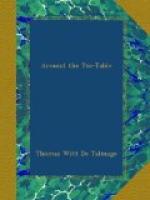Under such anathema the body has slept securely. A sexton once looked in at the bones, but did not dare to touch them, lest his “quietus” should be made with a bare bodkin.
From the church door we mounted our carriage; and crossing the Avon on a bridge which the lord mayor of London built four hundred years ago, we start on one of the most memorable rides of our life. The country looked fresh and luxuriant from recent rains. The close-trimmed hedges, the sleek cattle, the snug cottages, the straggling villages with their historic inns, the castle from whose park Shakspeare stole the deer, the gate called “Shakspeare’s stile,” curious in the fact that it looks like ordinary bars of fence, but as you attempt to climb over, the whole thing gives way, and lets you fall flat, righting itself as soon as it is unburdened of you; the rabbits darting along the hedges, undisturbed, because it is unlawful, save for licensed hunters, to shoot, and then not on private property; the perfect weather, the blue sky, the exhilarating breeze, the glorious elms and oaks by the way,—make it a day that will live when most other days are dead.
At two o’clock we came in sight of Kenilworth Castle. Oh, this is the place to stir the blood. It is the king of ruins. Warwick is nothing; Melrose is nothing, compared with it. A thousand great facts look out through the broken windows. Earls and kings and queens sit along the shattered sides of the banqueting halls. The stairs are worn deep with the feet that have clambered them for eight hundred years. As a loving daughter arranges the dress of an old man, so every season throws a thick mantle of ivy over the mouldering wall. The roof that caught and echoed back the merriment of dead ages has perished. Time has struck his chisel into every inch of the structure. By the payment of only three-pence you find access to places where only the titled were once permitted to walk. You go in, and are overwhelmed with the thoughts of past glory and present decay. These halls were promenaded by Richard Coeur de Lion; in this chapel burned the tomb lights over the grave of Geoffrey de Clinton; in these dungeons kings groaned; in these doorways duchesses fainted. Scene of gold, and silver, and scroll work, and chiseled arch, and mosaic. Here were heard the carousals of the Round Table; from those very stables the caparisoned horses came prancing out for the tournament; through that gateway strong, weak, heroic, mean, splendid, Queen Elizabeth advanced to the castle, while the waters of the lake gleamed under torchlights, and the battlements were aflame with rockets; and cornet, and hautboy, and trumpet poured their music on the air; and goddesses glided out from the groves to meet her; and from turret to foundation Kenilworth trembled under a cannonade, and for seventeen days, at a cost of five thousand dollars a day, the festival was kept. Four hundred servants standing in costly livery; sham battles between knights on horseback; jugglers tumbling on the grass; thirteen bears baited for the amusement of the guests; three hundred and twenty hogsheads of beer consumed, till all Europe applauded, denounced and stood amazed.




